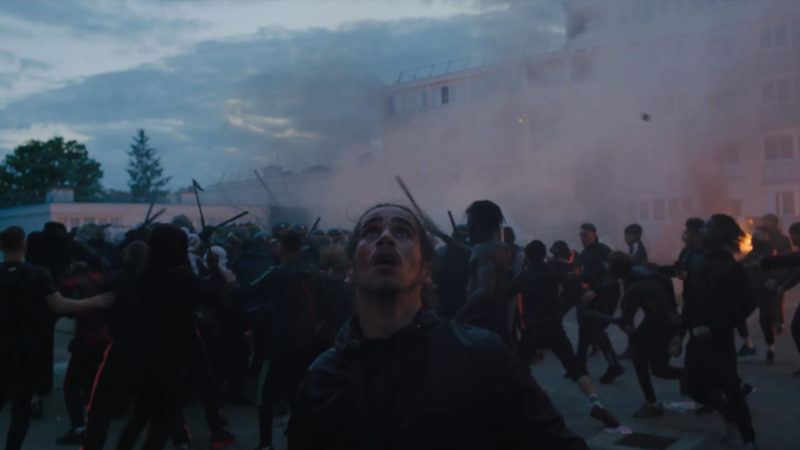
Athena, director Romain Gavras’ movie about an uprising in a French housing block following what appears to be a police killing of a child, is a riveting, thrilling, formally astounding rush. It opens with the most spectacular (stitched-together) long take I’ve seen in years: Without cutting, the camera follows a band of youths as they ransack a police station, steal a safe full of weapons, then flee down a highway back to their housing block, which has been converted into something like a medieval fortress. Somehow, over the course of a tight 97 minutes, the movie never lets up, holding and even building on the spectacle promised in the opening shot.
It feels like a miracle: How, you keep wondering, am I seeing this? How could this have been made? It’s a masterpiece, and it is almost certainly one of the best films of the year.
I’d say it’s the reason why I go to the movies, except that, well, it’s not the sort of movie one goes to see: It’s a Netflix film, which means I saw at home, and most of its other viewers probably will too.
Even on the small screen, it packs a wallop. No other shot quite matches the sheer bravado of the opening, but Athena’s formal daring continues throughout, with vivid and imaginative scenes practically hurling themselves at the viewer. The movie is structured as a sort of siege picture, with the youths who ransacked the police station defending their home against a battalion of SWAT-style riot cops. As the cops move through the housing block courtyard, they lock into a sort of Roman phalanx formation, while the surrounding kids set off bottle rockets and Molotov cocktails. It’s eerie, unsettling, and strangely gorgeous.
And there’s more to this movie than just technical gumption. Athena clearly has some sympathies with the rioters, who are reacting to viral video showing the brutal killing of a young boy. Their demand is simple: Release the names of the officers responsible. But the movie doesn’t simply let the rioters off the hook for their violence either: It makes sure to show the ways it hurts their fellow housing block residents, destroying their property, forcing them to evacuate, harming the vulnerable. It’s not a pro-riot movie, even if it feeds off the rioters’ chaotic energy.
It even manages to find some empathy for the police, by following one of the riot cops—a father of four, we learn—who is taken prisoner by the rioters. He’s just trying to survive and get home to his kids.
The main characters are the three older brothers of the slain child. One is the leader of the riots, another is a drug dealer trying to protect his business, and the other is a soldier who—just before the police station riot—addresses the media, demanding justice for his sibling but also pleaing for calm and peace. The violence breaks out before he finishes his remarks.
The movie’s commitment to propulsive action means the characters appear as sketches more than as fully drawn human beings. But they end up as tragic archetypes, brought together and apart by what amounts to a small-scale war for their home.
This French picture’s notions about urban unrest and police violence don’t quite fully map onto American debates about police killings, but they’re not unrelated. If there’s a flaw in the film, it’s a late twist that muddies and even absolves lines of responsibility for the inciting act of violence. Even still, it’s in service of a noble goal: The movie wants to see—and wants viewers to see—the situation through the eyes of each of its main characters and what they represent. It wants to understand people, not vilify them. Athena‘s capacity for empathy is nearly as spectacular as its filmmaking.
The post Netflix's <i>Athena</i> Is a Masterpiece About Police Violence and Social Unrest appeared first on Reason.com.
from Latest https://ift.tt/YV3IPu9
via IFTTT